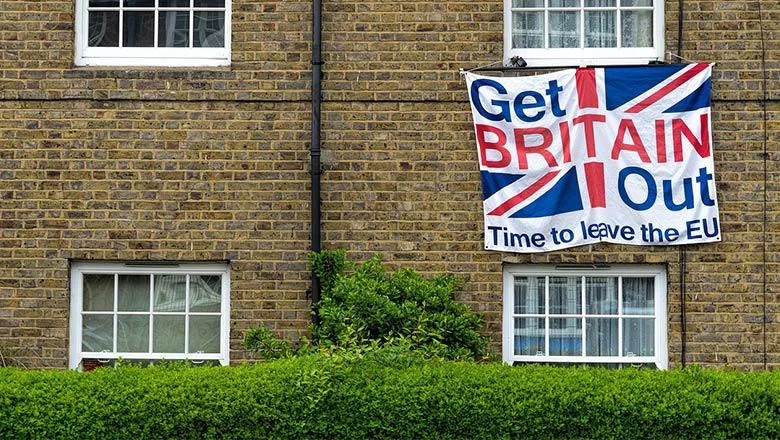11 February 2021
Lockdown scepticism not linked to pro-Brexit values
This is despite high-profile sceptics being Leave supporters

Lockdown scepticism and Brexit support: products of the same values divide?
Read the research
Public lockdown scepticism and Euroscepticism are not driven by the same psychological values – despite high-profile lockdown sceptics holding pro-Brexit views, a new analysis has found.
The findings, from researchers at King’s College London and the European University Institute are based on a survey of over 2,000 people using an established psychological model of 10 basic human values. The researchers examined the results alongside the same people’s views on whether the UK should accept limits on civil liberties in order to fight coronavirus or instead protect civil liberties at all costs.
They found that those who prioritised civil liberties over combatting the virus – lockdown sceptics – disproportionately valued hedonism, stimulation, power and achievement.1
By contrast, those who were more accepting of limits on freedoms during the pandemic overwhelmingly valued security, conformity, universalism and benevolence.
These different sets of values, the researchers conclude, do not fit at all well with the values divide that characterised Brexit.
In the case of the EU referendum vote, people who valued universalism were the strongest supporters of Remain, and those valuing security and tradition were the strongest backers of Leave. But, the researchers conclude, “these two groups now find themselves somewhat united in support of lockdowns”.
The analysis suggests that Nigel Farage’s new political party, Reform UK – which initially focused on promoting lockdown scepticism – is unlikely to find an easy coalition of support among the public, because the values held by lockdown sceptics are at odds with the values that drove support for Brexit.
The analysis also found that the psychological values motivating each side of the lockdown debate underpinned views on other aspects of the coronavirus crisis, too. For example, the values that predict lockdown scepticism – such as hedonism, stimulation and power – also predict a lower likelihood of getting a Covid-19 vaccine.
Professor Bobby Duffy, director of the Policy Institute at King’s College London, said:
“It’s been said that although far from all Brexiters are lockdown sceptics, almost all lockdown sceptics are Brexiters – and this is certainly the case with sceptics in the public eye. But despite the appearance that the two groups might share the same values, we found that such a link doesn’t hold up. Our analysis shows that lockdown scepticism is not another front in the UK’s supposed ‘culture wars’, where people’s views on a given issue are increasingly tied up with their political identity, such as whether they’re Leave or Remain. The values that have so divided the UK over Brexit are not also dividing us over Covid – if anything, they are uniting the country in the fight against the virus.”
James Dennison, part-time professor at the Migration Policy Centre of the European University Institute and researcher at the University of Stockholm, said:
“We were motivated to carry out this study because what an individual values in their own life has repeatedly been shown to predict their political views and voting behaviour, with Brexit being a prime example. We show that this is also the case with one’s preferences regarding how the government should respond to the pandemic. However, rather than repeating what we’ve seen since 2016 – when those who yearn for security, conformity and tradition were pitted against those who prioritise more open values like universalism – this time the motivations are quite different. Valuing security and universalism, especially, both strongly motivates favouring lockdowns, taking vaccines and prioritising ‘health over wealth’. By contrast, those who value power, ambition, stimulation and hedonism – some of the typically less politicised values – are highly motivated to protect civil liberties and prioritise the economy. This matters because understanding the value-based motivations of all sides is the best way to get buy-in, for example, by increasing the effectiveness of government communications.”
-------
1. The 10 basic human values are defined as follows:
Universalism: Understanding, appreciation, tolerance, and protection for the welfare of all people and for nature.
Benevolence: Preservation and enhancement of the welfare of people with whom one is in frequent personal contact.
Tradition: Respect, commitment, and acceptance of the customs and ideas that one’s culture or religion impose on the individual.
Conformity: Restraint of actions, inclinations, and impulses likely to upset or harm others and violate social expectations and norms.
Security: Safety, harmony, and stability of society, of relationship and of self.
Power: Attainment or preservation of a dominant position within the more general social system.
Achievement: Personal success through demonstrating competence according to social standards.
Hedonism: Pleasure or sensuous gratification for oneself.
Stimulation: Excitement, novelty, and challenge in life (a varied life, an exciting life, daring).
Self-direction: Independent thought and action – choosing, creating, exploring.
